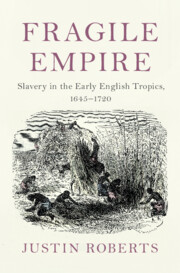Book contents
1 - Slave Empire
English Expansion in the Tropics
Published online by Cambridge University Press: 19 December 2024
Summary
This chapter traces the developing English empire across the global tropics. Like their European rivals, English colonists, traders, and governors turned to forced labor and migration to maintain the tropical empire. As they forged this empire, English investors experimented with a wide variety of different colonial models. The early empire was not so neatly divided into territorial expansion in the West and commercial settlement in the East. English colonial architects tried to extend plantation agriculture beyond the Americas to West Africa and the Indian Ocean, and they tried to bring the spices and peppers of the East Indies to the West Indies to grow. They became both imitators and innovators, modeling the successful endeavors of European rivals but also carving their own path. Many of their overseas ventures were utter failures. Yet, slave-produced goods and factories constructed and maintained by forced labor ensured profit margins that would be high enough to continue to attract investors. By the end of the seventeenth century, slavery had become the defining feature of the English tropical empire, and there were slave majorities at most English sites in the tropics.
Information
- Type
- Chapter
- Information
- Fragile EmpireSlavery in the Early English Tropics, 1645–1720, pp. 28 - 67Publisher: Cambridge University PressPrint publication year: 2025
